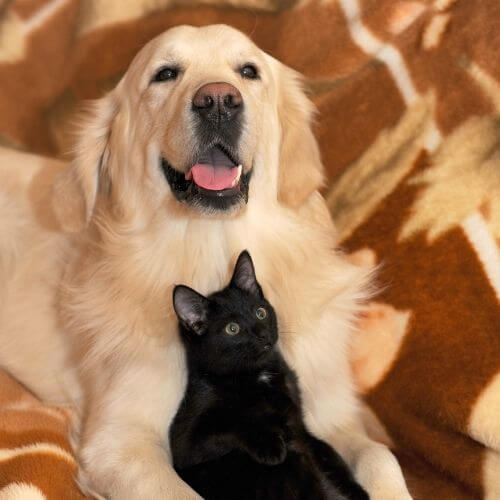No doubt, the greatest question being asked at this time is should you, or should you not vaccinate. This could be the debate of our era – both camps claiming science and facts, experience, the truth – the real truth and nothing but the truth. You may feel uncertain amongst all the information out there … you received that voice note on WhatsApp on all the side effects of the jabs (and you aren’t ready to be a router). You may have read something on Facebook (or a lot of things). Your aunt may be married to a specialist twice removed and is privileged to information no one else may know of (not even the command council and the World Health Organisation). You may doubt our leaders (I mean load-shedding?). Or you may have heard voices telling you the truth about vaccines. The vaccine drama feels endless. Fortunately, not so with your beloved furbabies. So back to the question at hand – should I vaccinate my cat or dog? This blog will give you some of the reasons why you should vaccinate your dog or cat, and provide general information about vaccines.
What are vaccines and what do they do?

According to AMVA.org, vaccines are given to cats and dogs (and other animals) to trigger their immune systems to form antibodies, which in turn protects them should they get exposed to the disease they got vaccinated against. So essentially, the vaccine gets their immune system to kick in and form anti-bodies (their body’s fighter pilots).
It is a preventative measure and saves millions of cats’ and dogs’ lives every year. Zoetis.co.za, in fact, claims that vaccinations are the most effective method in the prevention of infectious diseases in pets.
What is important to remember is that vaccinations will not cure an already sick animal – only healthy pets should be vaccinated. For example, you can’t inject an animal who contracted rabies with the vaccine and hope to cure them. Vaccines also need to be periodically boosted to ensure their effectiveness.
Why should I vaccinate my dog or cat?

There are several simple reasons why you should vaccinate your pets:
- Vaccinations are often the best form of prevention of illness,
- Vaccinations can help save you money in the long run (treatment plans are way more expensive than the vaccines),
- Vaccinations prevent the spread of viruses between animals-to-animals (including wild animals) and where applicable animals-to-humans (e.g. rabies); and
- Sometimes, you have to vaccinate your pets because the law requires it.
AMVA.org
What vaccines should my dog or cat receive?
In South Africa, vaccines for adult dogs include:
- DHLPP (Distemper, Hepatitis, Leptospirosis, Parainfluenza, Parvovirus)
- Corona*
- Rabies
- Bordatella (Kennel Cough) – if going to kennels
Ultra-pet.co.za
(*Corona is a viral disease of the intestines in dogs. Do not dump your pet at a shelter thinking he or she may give you Covid-19).
In South Africa, vaccines for adult cats include:
- Feline panleukopenia (feline parvovirus)
- Feline herpesvirus infection
- Feline calicivirus infection (respiratory infection and oral disease)
- Rabies
BlueHillsvet.co.za
In South Africa, vaccines for puppies include:
- 1st puppy vaccine (around 8 weeks): DHPP and Corona*
- 2nd puppy vaccine (around 12 weeks): DHPP and Corona*
- 3rd puppy vaccine (around 16 weeks): DHPP and Corona*
- Rabies vaccine (repeat 1 year later)
Ultra-pet.co.za
(*Corona is a viral disease of the intestines in dogs. Do not dump your pet at a shelter thinking he or she may give you Covid-19).
In South Africa, vaccines for kittens include:
- 1st kitty vaccine (around 8 weeks): Calicivirus (respiratory infection and oral disease), Panleukopenia (feline parvovirus), Rhinotracheitis (herpesvirus infection) and Feline leukaemia virus
- 2nd kitty vaccine (around 12 weeks): Same as above but with 1st rabies vaccine
- 3rd kitty vaccine (around 16 weeks): rabies booster vaccine
Savetshops.co.za
Are there additional vaccinations, I can give my dog or cat?

Yes. There are what are known as “core” vaccines and “non-core” vaccines. For example, non-core vaccines for your cat may include vaccines against Chlamydiosis (bacteria-based chronic respiratory infection) and Feline immunodeficiency virus (feline AIDS). Your local vet can discuss each of your pet’s risk and lifestyle factors to cover them adequately.
How often should my dog or cat be vaccinated?

Most Vets recommend that vaccines and general check-ups happen annually in adult cats and dogs. Your vet can advise what is best in your situation. But kittens and puppies (as indicated above) need more frequent vaccinations and check-ups initially.
Why do puppies and kittens need more frequent vaccinations?

Kittens and puppies are vulnerable to diseases as their immune systems have not developed or been exposed to much. Yes, they do receive some protection if they are nursing on their mother’s milk. And sometimes this can actually interfere with the vaccines and their effectiveness. For these reasons, it is important that your kitten or puppy get their vaccines around 8, 12, and 16 weeks (and thereafter annually or as prescribed by your vet).
Are there risks involved in vaccinating my cat or dog?

With any treatment there are risks. Zoetis.co.za, explains the associated risk of the vaccines is far outweighed by the benefits of receiving them.
But some of the common, mild symptoms your dog or cat may experience after vaccination include:
- Irritation around the area where the vaccinations were given,
- Slight fever,
- Slight decrease in appetite and activity, and
- Sneezing, moderate coughing, runny nose and the like, a few days to a week after the vaccinations.
AMVA.org
Some of the more adverse effects that should be monitored and would require a vet’s visit include:
- Continuous vomiting or diarrhoea,
- Irritated skin or welts,
- Swelling around the face, neck and head,
- Constant coughing or any difficulty breathing,
- Falling over or persistent lethargy, and
- A lump at the vaccination point on the dog’s or cat’s body that doesn’t disappear after a month or enlarges over time.
AMVA.org
What goes paw-in-paw with keeping my dogs’ or cat’s vaccinations up to date?

As mentioned, vaccines are preventative. Although extremely beneficial for your dog’s or cat’s overall health, vaccines work well with other protocols and measures. One is regularly getting rid of any internal or external pests – Bravecto and Broadline have great spot-on treatments. Two, get the right food for your pet, as advised by your vet (this may change over a year – so keep communicating with your trusted vet). Three, keep your pet active and at a healthy weight. Four, it’s important that you know your pet (duh – right?). Observe how they move, act, eat, react, and interact. If you know your pet, their body, and their behaviour, you will instantly pick up if something is off with them. This way you can take your pet to the vet quickly before a disease or situation escalates.

To answer the question – should I vaccinate my dog or cat? Yes. Whether you are pro or against vaccines for yourself, be pro-vaccines for your dog and cat. This can save you many vet bills in the long run and mean a happy and long life for your pet.
Recommended reads for you:
Some awesome sources on vaccinating your pet:
- Your trusted local Vet
- https://www.avma.org/resources-tools/pet-owners/petcare/vaccinations
- https://www.news24.com/health24/lifestyle/pet-health/about-pet-health/why-should-i-vaccinate-my-pet-20130410
- https://ultra-pet.co.za/evet/evet-vaccinations/
- https://www.bluehillsvet.co.za/vaccinations/
- https://www.zoetis.co.za/health-management/cat-vaccines-and-vaccination.aspx
- https://www.hillspet.co.za/cat-care/routine-care/vaccinating-your-kitten
